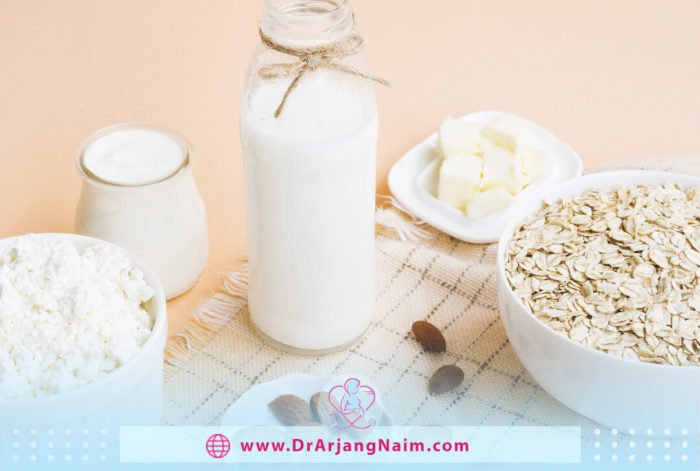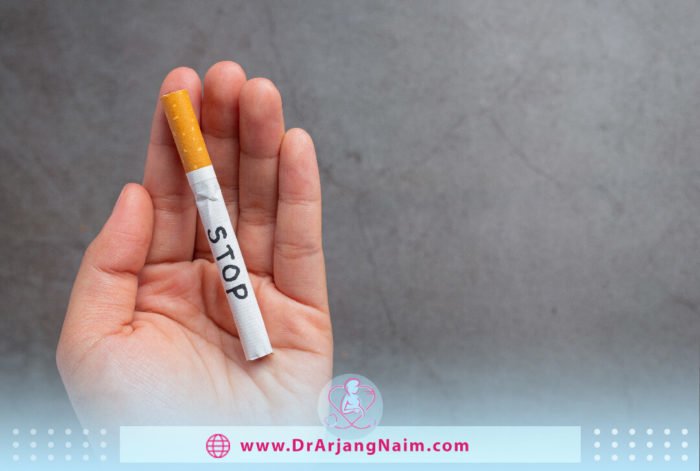Pre-pregnancy nutrition is one of the pre-pregnancy measures. It is an important and effective factor in the pregnancy process. Having a proper diet is one of the most important factors in the health and growth of the fetus and success in pregnancy.
Following a healthy diet before pregnancy can help boost fertility, reduce the risk of birth defects such as spina bifida, and even reduce the risk of preeclampsia during pregnancy.
Key nutrients that should be consumed before pregnancy
A woman who decides to become a mother needs a combination of healthy foods rich in nutrients.
Folic acid/folate
This vitamin (B9) is one of the most important nutrients consumed before (and during) pregnancy. The Centers for Disease Control and Prevention (CDC) states that women should consume 400 micrograms of folic acid daily for at least one month before pregnancy. Folic acid is essential for forming healthy cells and can also help prevent birth defects such as spina bifida and encephalitis.
Finding folic acid in whole foods can be challenging, so women need to ensure their pregnancy vitamin contains 400 to 600 micrograms. Folic acid is found in the following foods:
- Leafy green vegetables
- Fortified cereals
- Oranges and strawberries
- Beans and nuts
Calcium

Calcium makes the reproductive system work well and even helps pregnancy to happen faster.
If the mother has low calcium stores during pregnancy, the body takes calcium from the mother’s bones and gives it to the growing baby, which may increase the risk of osteoporosis in the future. 1500 mg of calcium should be consumed daily. Calcium sources include:
- Milk
- Yogurt
- Cheese
- Kale and broccoli
Iron
Iron carries oxygen throughout the body. It is also very important to deliver oxygen to the baby. Too little iron can increase the risk of premature and low birth weight infants. Women need about 18 milligrams of iron a day, but their daily iron needs increase to 27 milligrams a day after pregnancy. The body absorbs iron better from food. Good sources of iron are:
- Fortified breakfast cereals
- Lean meats
- Spinach
- Lean meats
Omega-3 fatty acids
Omega-3 fatty acids help regulate key hormones that stimulate ovulation and increase blood flow to the reproductive organs. Many pre-pregnancy vitamins contain omega-3s, but it is important to get them from omega-3 foods. Foods containing omega-3 include:
- Seafood
- Grass-fed beef
- Nuts and seeds
Fiber
Eating more complex and slow-digesting carbohydrates, such as fiber, in the diet will make you feel full for longer. Increasing fiber intake by 10 grams per day may reduce the risk of gestational diabetes by 26 percent.
Some good sources of fiber include:
- Whole grains
- High-fiber cereals
- Fruit and vegetables
- Beans and legumes
Protein
In general, proteins help provide the baby with important nutrients. But some proteins are better than others. When a woman is planning to become pregnant, she should consume two to three servings of protein a day, one of which should be plant-based. Foods that are high in protein include:
- Fish
- Lean meats
- Black beans
Natural ways to boost fertility
There are several natural ways to increase fertility. Choosing food and changing lifestyles can help increase fertility.
Eat foods rich in antioxidants
Antioxidants such as folate and zinc can improve fertility for both men and women. They inactivate free radicals in the body that can damage sperm and egg cells. Foods such as fruits, vegetables, nuts, and whole grains are full of beneficial antioxidants such as vitamins C and E, folate, beta-carotene, and lutein.
Eat a bigger breakfast

Eating a larger breakfast may improve the hormonal effects of polycystic ovary syndrome (PCOS), one of the leading causes of infertility. For moderate-weight women with polycystic ovary syndrome, eating more calories at breakfast reduces insulin levels by 8 percent and testosterone levels by up to 50 percent. High levels of both can contribute to infertility.
Avoid trans fats
Eating healthy fats every day is important for boosting fertility and overall health. However, trans fats are associated with an increased risk of ovulatory infertility due to their negative effects on insulin sensitivity. Trans fats are commonly found in hydrogenated vegetable oils and are commonly found in some margarine, fried foods, processed products, and baked goods.
Eat fewer refined carbs
In general, not only the amount of carbohydrates consumed is important, but also the type. Refined carbohydrates include sugary foods and beverages and processed grains such as white pasta, bread, and rice. These carbohydrates are absorbed very quickly and increase blood sugar and insulin levels. Refined carbohydrates also have a high glycemic index (GI).
Insulin is chemically similar to ovarian hormones. These hormones help our eggs mature. Constantly increasing insulin can cause the body to produce fewer reproductive hormones because it thinks it does not need it. This can contribute to egg immaturity and ovulation.
Choose high-fat dairy
Excessive consumption of low-fat dairy products may increase the risk of infertility, while high-fat dairy foods may reduce it. Women who consume one or more servings of high-fat dairy a day are 27 percent less likely to become infertile. To take advantage of these potential benefits, try replacing one low-fat dairy meal a day with one high-fat dairy meal, such as a glass of whole milk or high-fat yogurt.
Get active

Exercise has many health benefits, one of which is increased fertility. Increased moderate physical activity positively affects fertility in men and women, especially obese people. Excessive exercise may alter the balance of energy in the body and negatively affect the reproductive system. Gradually increasing physical activity is the best method.
Take time to relax
As stress levels increase, the chances of getting pregnant decrease. This is probably due to the hormonal changes that occur when feeling stressed. Using methods to reduce stress levels during this period can increase the chances of pregnancy.
Aim for a healthy weight
Weight is one of the most influential factors in male and female fertility. Being underweight or overweight is associated with increased infertility. The amount of fat stored in the body affects the function of menstruation. Obesity is especially associated with anovulation and menstrual irregularities, as well as with impaired egg growth.
To increase your chances of getting pregnant, lose weight if you are overweight, gain weight if you are underweight.
Cut back on caffeine
Despite what you may have heard, pregnant women can drink coffee, but the American College of Obstetrics and Gynecology (ACOG) and other groups say expectant mothers should not consume more than 200 mg of caffeine a day. Drinking too much during pregnancy can slightly increase the risk of miscarriage.
Don’t smoke

Using tobacco can make it harder for women to conceive and increase the risk of miscarriage when they become pregnant. In addition, both smoking and breathing in smoke can cause a baby to lose weight and put them at risk for birth defects and health problems.
What impacts female fertility?
Although Pre-pregnancy nutrition is an important part of preparing the body for a healthy pregnancy, other factors can play a role. Including:
- Age: Women are born with all their eggs, and the quantity and quality decrease with age. Therefore, with age fertility decreases.
- Genetic: Chromosomal abnormalities and genetic diseases can reduce fertility.
- Medical conditions: Polycystic ovary syndrome, celiac disease, diabetes, endometriosis, anemia, and thyroid disease are associated with infertility.
- Medications: Some drugs can interfere with various aspects of fertility, such as ovulation, egg implantation, and the function of the fallopian tubes.
- Previous pregnancies: Previous pregnancies indicate that infertility is less likely than couples who have never been pregnant before.
- Activity levels: Exercise increases fertility reduces the risk of ovulation problems and the risk of miscarriage. In addition, if a woman is regularly active, she is less likely to have pregnancy-related side effects such as back pain and ankle swelling.
- Sexual activity: The time and frequency of sexual intercourse affect the chances of a successful pregnancy. If there is regular (2 to 3 times a week) sexual intercourse, the chances of pregnancy increase.
The bottom line
Good Pre-pregnancy nutrition is essential for a healthy body and reproductive system and helps conceive. Having a nutritious diet and making positive lifestyle changes can help boost fertility and prepare the body for pregnancy. If you are trying to conceive, it is important to start eating healthy and choosing a lifestyle today.
Pre-pregnancy nutrition is important for both men and women and is one of the most important pre-pregnancy measures. Men should also follow a pre-pregnancy nutrition to increase fertility.
Additional questions
1. What is prenatal care called?
Prenatal care helps find issues that can affect the pregnancy, so the mother and doctor can take steps to prevent potential problems.
2. Do dental problems affect pregnancy?
Pre-pregnancy dental treatment can help keep teeth and gums healthy and reduce the risk of preterm birth.
3. What’s the best type of protein?
Vegetable proteins can be more helpful than animal proteins, focusing on lentils, beans, legumes, nuts, and seeds.
4. What to do before pregnancy?
- Make a Plan and Take Action
- See Doctor
- Take 400 Micrograms of Folic Acid Every Day
- Stop Drinking Alcohol, Smoking, and Using Certain Drugs
- Avoid Toxic Substances and Environmental Contaminants
- Reach and Maintain a Healthy Weight
- Get Mentally Healthy
5. Does smoking permanently damage fertility?
Smoking can damage DNA in sperm. There is evidence that men with high sperm count and DNA damage may have reduced fertility and more miscarriages. In addition, smoking is a risk factor for erectile dysfunction (ED) that can make pregnancy a challenge.
References:
https://www.childrensnutrition.co.uk/full-blog/pre-pregnancy-diet




